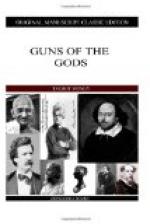“There is proof conclusive,” he began, “—I’ve telegrams here that you may see in confidence, that Gungadhura has been trafficking with Northwest tribes. He has sent them money, and made them promises. There isn’t a shade of doubt of it. The evidence is black. The question is, what’s to be done?”
They passed the telegrams from hand to hand, Norwood looking rather supercilious. (The police could handle espionage of that sort so much better.) But it was the youngest man’s place to speak first.
“Depose him, I suppose, and put his young son in his place,” suggested Topham. “There’s plenty of precedent.”
The doctor shook his head.
“I know Gungadhura. He’s a bad strain. It’s physiological. I’ve made a study of these things, and I’m as certain as that I sit here that any son of Gungadhura’s would eventually show the same traits as his sire. If you can get rid of Gungadhura, get rid of his whole connection by all means.”
“What should be done with the sons, then?” asked Sir Hookum Bannerjee, father of half a dozen budding lawyers.
“Oh, send ’em to school in England, I suppose,” said Samson. “There’s precedent for that too. But there’s another point. Mukhum Dass the money-lender has been foully murdered, struck down by a knife from behind by some one who relieved him of his money. Either a case of simply robbery, or else—”
“Or else what?” Colonel Willoughby de Wing screwed home his monocle.
“That’s as obvious as twice two. That rascal Mukhum Dass was bound to die violently sooner or later. He was notoriously the worst usurer and title-jumper on this side of India. He charged me once a total of eighty-five per cent. for a small loan—and legally, too; kept within the law! I know him!”
“On the other hand,” said Samson, “I’ve been informed that the cellar of the house at present occupied by those Americans on the hill—the gold-miner, you know—Blaine—was burgled last Sunday morning. Blaine himself complained to me. It seems that he had given Gungadhura leave to search the cellar, at Gungadhura’s request, for what purpose Blaine professes not to know. Blaine himself, you may remember, lunched and dined at the club last Sunday and gave three of us a rather costly lesson in his national game of poker. It took place while he was with us at the club. He has been able to discover, by cross-examining some witnesses—beggars, I believe, who haunt the house,—that Mukhum Dass got to the place ahead of Gungadhura, burgled the cellar, removed something of great value to Gungadhura, and went off with it. On the way home he was murdered.”
“The murder of Mukhum Dass was known very soon afterward, of course, to the police,” said Norwood. “But we can’t do anything across the river without orders. Why didn’t Mr. Blaine bring his complaint and evidence to me?”
“Because I asked him not to!” answered Samson. “We’re mixed up here in a political case.”




